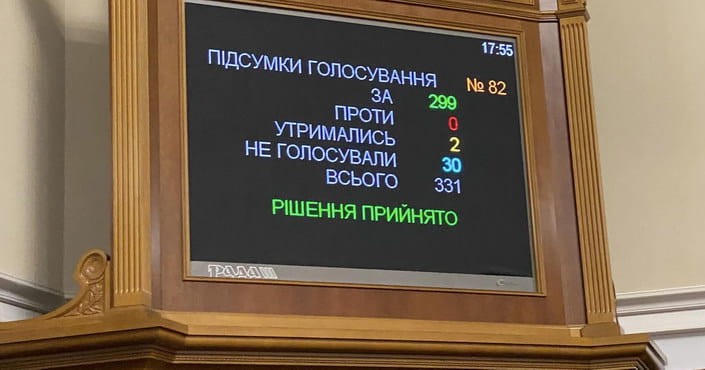Ukraine Reforms Media Regulation during the War. Why Now and What Does It Change?

Ukrainian version of the text is available by the link.
The Verkhovna Rada of Ukraine has adopted, and the President has signed, the Media Law.
This document is one of the prerequisites for starting the negotiation on Ukraine’s EU membership. Actually, this is the main reason why the Media Law was passed by almost a constitutional majority of votes and was supported by both the government and the opposition, making large-scale media reform much more legitimate.
However, the value of this document is not limited to the "Made for the EU" label.
Here are eight reasons why it should be considered one of the most important parliamentary achievements of the year.
First reason: fight against the aggressor
The Media Law is aimed at strengthening the protection of Ukraine’s information space against the impact of Russia, the aggressor state for Ukraine.
It contains restrictions on the activities of Russian media owned by Russian citizens. The Media Law also prohibits dissemination of materials that cast doubt on the territorial integrity of Ukraine and contain propaganda in favour of the aggressor state and its public authorities.
Obviously, Russia’s propaganda machine launched quite a campaign against our Media Law. Speaker of the Ministry of Foreign Affairs of the Russian Federation Maria Zakharova even reduced herself to open rudeness.
Well, this only means one thing: we’ve done everything right!
Second reason: content must be in Ukrainian
The Media Law lays the basis for further strengthening the position of the state language in the media. In particular, it contains the definitions of a programme and a film in the Ukrainian language.
The minimum share of content in the Ukrainian language on national television will gradually increase from 75 percent to 90 percent. This change will happen not by July 2024, as originally planned, but by February 2024.
Third reason: online media becomes legal
The Media Law also applies to online media.
Until now, it has seemed that the Internet did not exist in Ukrainian media legislation: neither websites nor video services were covered.
The regulation of mass media was stuck back in Soviet times, when the main mass media was the Vremya news programme. The Regulator monitored the compliance of TV channels within the law; while online media, even those getting millions of views, were in a kind of a grey zone.
The new Media Law, however, corresponds to current realities. It defines information sharing platforms (e.g. Facebook, Twitter), video sharing platforms (e.g. YouTube) and OTT platforms.
Let me immediately debunk rumours and fake news: Bloggers are not required to register, and the Regulator will not come after them. However, YouTube bloggers have an opportunity to voluntarily register if they want to be officially called "media" and be voluntarily subject to the Media Law, while obtaining the status of a journalist and legislative protection over their work.
Fourth reason: common regulation
The Media Law provides for the participation of co-regulatory bodies in determining best practices in the areas of biggest concern.
This can be illustrated by the example of sponsorship or product placement, or by the need to define hate speech.
In these areas, the Media Law provides for general prohibitions or restrictions, but it is unnecessary and impossible to set them out in detail at the regulatory level. It is not possible, by any stretch of the imagination, to spell out in a law or in a regulatory act the entire range of possible manifestations in advertising that should be subject to regulation. Nor it is possible to describe in a formal manner all possible cases of specific restrictions.
Therefore, this level of detail may be provided for by market participants (i.e., all types of media), jointly with the Regulator, in relevant codes of conduct that must, by no means, be inconsistent with the Media Law.
Fifth reason: remedy instead of punishment
One more novelty deals with the cases when the registered media commits violations.
We implemented a system of instructions: These are not sanctions, but rather a notification system for errors. Only after the media accumulates a lot of urevoked instructions, the Regulator proceeds to impose fines.
And when fines are not enough and violations are systemic and serious, the Regulator takes the violator to court. It’s quite liberal, isn’t it?
Sixth reason: the court comes first
Only the court may revoke a TV channel’s licence or block registered online media.
It is important to note that this mechanism provides more guarantees for freedom of speech than in some European states. In many EU countries, the regulator may revoke a media’s licence out of court, and only then may the media appeal the decision in court. Let us remember the recent story about the Latvian regulator’s decision concerning Dozhd TV channel. The revocation of the channel’s licence entered into force immediately, and only then could the TV channel decide whether or not it would appeal.
This example again shows that our Media Law is liberal.
Still, there is an exception. And it is justified.
A different procedure is applied to stop the activity of anonymous websites, i.e., those that decided neither to identify themselves nor to be subject to professional regulation.
There is a category of websites that contain no data about the editorial team, the publisher, etc.
They are often called "fake news media". The Regulator may block them by an out-of-court decision if the media systematically disseminates any prohibited content, e.g., praise the "Russian world". However, even these media can appeal against the prohibition ex post.
If the unregistered media has identification data (i.e., contacts for the editorial team, the chief editor, and authors are indicated), it can be blocked without a court judgment in exceptional cases, but only temporarily for a period of 14 days.
Seventh reason: digitalisation
Hardcopy paperwork should become a thing of the past.
Regulated entities can communicate with the Regulator via an electronic account, which will replace paper correspondence.
There is one more novelty that is related to and is beneficial for the media: an authorisation for satellite broadcasting will become significantly cheaper, and a licence will be replaced with a simpler process of registration.
Eighth reason: changes for public broadcasting
There is a separate block of changes. In particular, the Suspilne will at last be able to implement joint projects with other companies.
The Suspilne has a lot of branches and unique content. That’s why strong market players, including foreign ones, are bound to be interested in co-production, e.g., creating a war documentary.
So what’s wrong with the Media Law?
Some articles that should have been in the updated media legislation have not been included, particularly the articles that improve regulation of pre-election campaigning, make it closer to current realities, taking into account the experience that has already been gained in Ukraine.
Here is an example.
Each election is accompanied with some "social surveys", where an unknown politician beats all of his competitors and then gets his well-deserved 1.5 percent of votes. This is just one example of misleading campaigning that should be limited.
I am happy, however, that we managed to reach a compromise with other political actors in the Parliament on the majority of the articles in the Media Law. Unfortunately, I cannot say the same about everything relating to elections. Due to the ultimatums from some political actors, we were not able to include those articles in the Media Law.
My colleagues and I have already registered the draft law "On Amending the Election Code of Ukraine As Regards Improving Regulation of Information Support for Election and Pre-Election Campaigning".
This draft law contains changes related to: journalists’ right to unimpeded access to public pre-election events; the openness of information contained in documents for registering candidates and in financial statements; and, the procedure for disseminating pre-election campaign materials by media entities in any form, including on the Internet. Of course, we have included requirements for representative public opinion polls.
I hope that the Members of Parliament who really see Ukraine as a part of Europe will press their green buttons in this case.
The EU criterium has not yet been fulfilled
But that’s not all!
In order to implement the European Audio Visual Directive in the Ukrainian legislation in full (criteria defined by the EU for starting negotiation on EU membership), we must also adopt some amendments to a law on advertising.
The relevant working draft has already been sent to the European Commission. We hope to register that draft law as early as in January 2023, taking into account the opinions of European experts.
These amendments are really necessary for the Ukrainian media field.
They are necessary for us, not only for the sake of fulfilling EU requirements.
At present, we have no rules for disseminating advertising in the form of product placements, though we see it in many programmes and TV series.
This law will require acknowledging product placement in the credits and will prohibit product placement of tobacco and prescription drugs. We also want to change an advertising rate per hour.
There is adoption of one more law by the Verkhovna Rada coming ahead, which will make our media market more European.

by Yevheniya Kravchuk,
Member of Parliament of Ukraine, "Servant of the People" faction